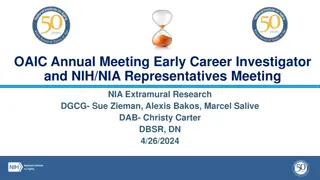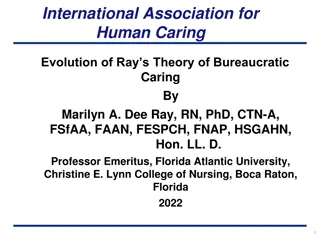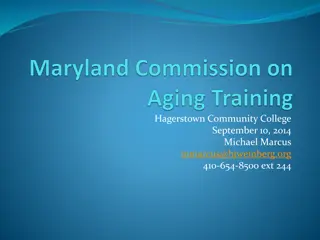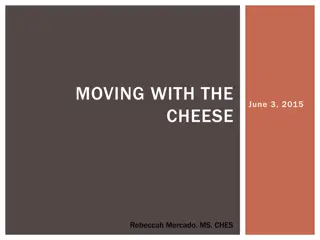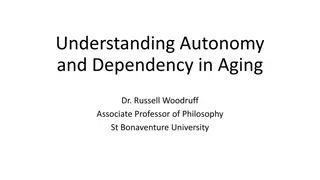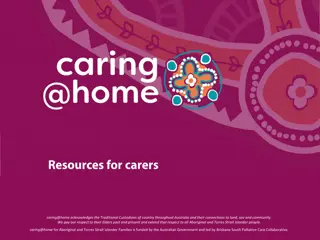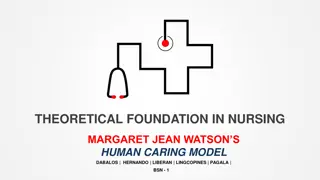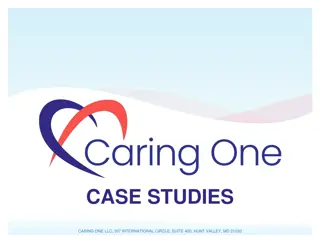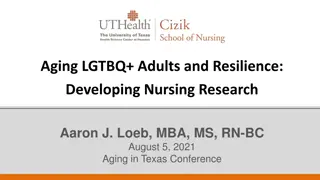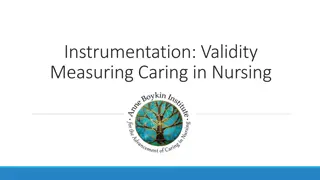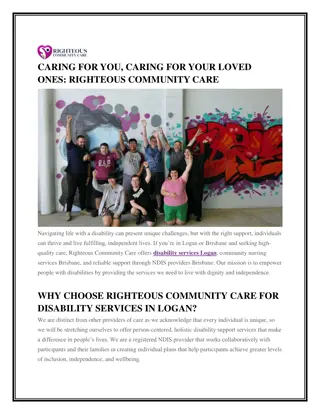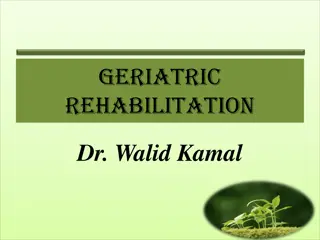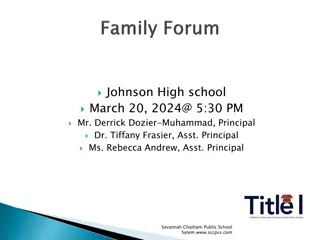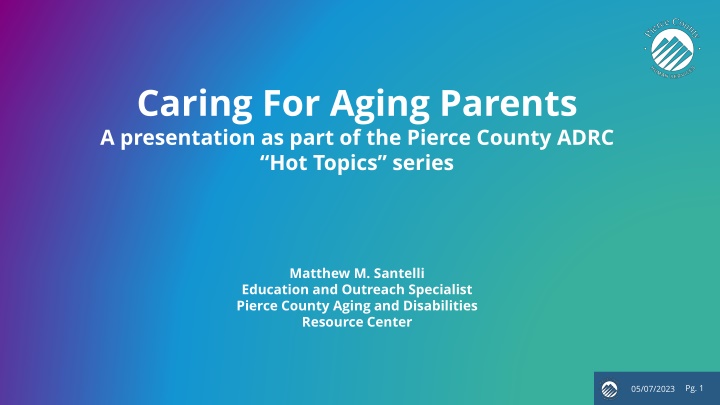
The Duties and Challenges of Caregivers for Aging Parents
Discover the essential duties of unpaid family caregivers, the evolving roles in caregiving, and the increasing demands faced by caregivers in providing support for aging parents. Learn about financial management, household tasks, medical appointments, and more. Gain insights into the changing dynamics of caregiving in today's society.
Download Presentation

Please find below an Image/Link to download the presentation.
The content on the website is provided AS IS for your information and personal use only. It may not be sold, licensed, or shared on other websites without obtaining consent from the author. If you encounter any issues during the download, it is possible that the publisher has removed the file from their server.
You are allowed to download the files provided on this website for personal or commercial use, subject to the condition that they are used lawfully. All files are the property of their respective owners.
The content on the website is provided AS IS for your information and personal use only. It may not be sold, licensed, or shared on other websites without obtaining consent from the author.
E N D
Presentation Transcript
Caring For Aging Parents A presentation as part of the Pierce County ADRC Hot Topics series Matthew M. Santelli Education and Outreach Specialist Pierce County Aging and Disabilities Resource Center Pg. 1 05/07/2023
Disclaimer The information provided during this presentation is not intended to serve as an exhaustive list of aging parent situations. Family caregivers needing support should consult with social service professionals, legal experts, physicians, family members, and other trusted individuals to develop a plan for long-term care. Pg. 2 05/07/2023
Presentation topics 1. 2. 3. 4. 5. 6. 7. 8. 9. 10. Health and safety tips for caregivers Who is a caregiver? What are the duties of a caregiver? When do you know that you are a caregiver for aging parents? Caregiving by the numbers Challenges facing caregivers Dementia warning signs Actions that family members should take for proper care planning Professional care options for aging parents Making the home safer and more accessible for aging parents Pg. 3 05/07/2023
How do we determine who is a caregiver? Today we will consider you to be unpaid family and friend caregivers. A caregiver is giving the care and a care receiver is getting the care. Often there are also care supporters involved who help out when needed. Most adult children of aging parents are now helping them as their caregivers. The definition of what is a caregiver changes over time as family dynamics, the economy, and our longevity changes. Technological changes have also imposed an additional burden on caregivers, along with greater risks of financial exploitation that caregivers must monitor. Giving care as a caregiver can be defined in many different aspects, as noted on the following slides. Because our life spans have increased due to new technology and modern medicine, the number of older adults who need care is rapidly growing. In fact, the fastest growing group of people in the United States are those who are 80 years or older. Pg. 4 05/07/2023
Caregiver duties include, but are not limited to: Managing care receiver finances including paying bills, filing taxes, shielding against financial scams; Understanding and effectively using online platforms for access to care receiver bank accounts, investment accounts, tax filing, and email communication with friends, family, and professional service providers; Purchasing and delivery of groceries and household items; Scheduling/transportation to medical/dental/vision appointments; Housekeeping services including vacuuming, sweeping, laundry, bathroom and kitchen cleaning, yard maintenance, scheduling of furnace/plumbing/electrical maintenance/phone/computer maintenance and repairs; Motor vehicle maintenance and cleaning; Purchase/installation of supportive medical equipment at home; Prompts and direct assistance for care receiver personal hygiene including dressing, bathing, toileting, foot care, medication management, meal preparation, vision care, dental care; Pg. 5 05/07/2023
More caregiver duties Locating, understanding, and filing for benefits including Social Security retirement/disability, Medicare/Medicaid, and so on; Locating, understanding, and filing for Durable Power of Attorney forms, Protective Payee forms, Advance Directives, POLST Forms, Last Will and Testament, and so on; Emotional support and companionship; Having meals together; Watching TV programs or sports together; Working in the yard together; Taking walks together; Car rides together; Attending faith services together; Arranging the COVID-19 vaccine boosters and other preventive vaccines for caregiver and care receiver at physician offices or local pharmacies. Pg. 6 05/07/2023
How did I recognize that I had become a caregiver for my parents? I recognized that I had become the caregiver for my parents when the activities I did with my parents were no longer the things I WANTED to do WITH them, but instead were the things I NEEDED to do FOR them. An example of this recognition occurred when I drove mom or dad to the doctor s office. Early on it was an infrequent, easy drive with my healthy parent to and from the office, changing over the years with my ill parent into something much more frequent and challenging, often requiring several hours of my time. As the health needs of mom or dad became more serious, these trips required a significant amount of preparation time, to ensure that mom or dad took medications, ate meals, showered, dressed, and had me drive them to the doctor s office. For the appointment, I physically assisted them into the office, asked questions of the doctor, took notes, and then scheduled follow-up appointments for diagnostic tests and specialist visits, along with stopping at the pharmacy on the way home to pick up prescriptions. Pg. 7 05/07/2023
Caregiving by the numbers In general, unpaid caregivers make up 43.5 million people in the United States. The amount of people in unpaid care roles continue to increase for both child and adult patients. When caring for an adult age 50 or older, about 34.2 million Americans will take an unpaid caregiver role. More debilitating conditions like Alzheimer s or other forms of dementia cause about 15.7 million family caregivers to step into unpaid support roles lacking proper training. Caregivers tend to vary in age much more than care recipients. While 48% of caregivers are 18-49 years old, only 14% of patients fall into the same age range. The average age of a caregiver sits at about 49 years old. This could reflect parents living longer and adult children then becoming caregivers for their parents. Pg. 8 05/07/2023
Challenges facing caregivers The number of older adults who need care is rapidly growing. The fastest growing group of people in the United States are those who are 80 years or older. This leaves fewer young family members to provide adequate care and support for seniors. About half of caregivers are employed, which makes adequate care even more difficult to provide. Dual income households are increasingly more common, leaving less time for caregiving. People are having fewer children or none at all, there are higher divorce rates, more people are opting out of marriage, and blended families are growing. All of these factors mean that fewer people can act as caregivers for family members and loved ones. If patients do not have a family member to care for them, they are forced to pay privately for care in the home, apply for government sponsored care in the home, or seek placement in a care facility. Professional care facilities are often the only option for family members seeking consistent quality care for loved ones. Professional care providers are struggling to fill positions! Pg. 9 05/07/2023
Caregiver mortality Overall, 30% to 70% of husband/wife/partner caregivers ages 60 and older die before their care receivers die. Planning ahead for this likelihood is essential, not only for the caregiver and care receiver but also for everyone else in the family. 05/07/2023 Pg. 10
Have you noticed any of these dementia warning signs? EARLY DETECTION MATTERS! Memory Loss First and worst /Confusion/Personality changes Alzheimer s Association information 1. Memory loss that disrupts daily life: Forgetting recently learned information is a common sign of dementia. Ask yourself what is typical for your family member? Mymom became unable to remember how to work the digital oven controls after six months of using it with no problems. Challenges in planning or solving problems: Trouble following a familiar recipe, no longer able to write checks or keep track of monthly bills and scheduled appointments. Ask yourself what is typical for your family member? My mom s dining room table piling up with unopened letters, unable to write checks anymore even when given step-by-step directions, but she could still clearly sign her name. 2. 05/07/2023 Pg. 11
Have you noticed any of these dementia warning signs? EARLY DETECTION MATTERS! Memory Loss First and worst /Confusion/Personality changes (cont d) 3. Difficulty completing familiar tasks at home/work/leisure: Not reading favorite magazines or newspapers, not changing clothes or wearing odd clothing combinations, not safe to drive due to inattention/visual disturbances/slow reaction times. Ask yourself what is typical of yourfamily member? My mom no longer could remember the sequence to starting car/taking brake off/putting car into drive/fastening seatbelts. Confusion with time or place: Losing track of dates, seasons, and the passage of time. Forgetting where they are or how they got there. Ask yourself what is typical of your family member?My momwatching Christmas in July movies on Hallmark Channel and convinced that she needed to prepare a Christmas Eve meal. Saying that the church building had totally changed or that lodge meetings were in a completely different location now . 4. 05/07/2023 Pg. 12
Have you noticed any of these dementia warning signs? Early detection matters! Memory Loss First and worst /Confusion/Personality changes (cont d) 5. Trouble understanding visual images and spatial relationships: Difficulty judging distances, determining shapes and colors, unable to understand proper usage of tools and utensils. Easy to recognize in most family members.My mom could not respond when I pointed to a roll of blue tape on the shelf, could not understand when I wrote On/off with an arrow on a post-it note pointing to the power button on the TV, would often scream when walking down a flight of stairs that I was pushing her off a cliff . Difficulty with words in speaking or writing: Unable to finish sentences, unable to voice their needs or how they are feeling, unable to write a sentence out on a page. Difficult to recognize in many family members. My mom became unable to write any words or numbers on a page other than her signature, could not engage in conversation unless directly addressed by one of us, slow to respond. 6. 05/07/2023 Pg. 13
Have you noticed any of these dementia warning signs? EARLY DETECTION MATTERS! Memory Loss First and worst /Confusion/Personality changes (cont d) 7. Misplacing items and blaming others: Household items being left in improper places, like purses placed in the refrigerator or letters placed in a cookie jar. Ask yourself what is typical for your family member? My mom would insist that one of us had moved her things just to upset her or that someone had come into the house just to drive her crazy. Decreased or poor judgement: Giving away money or valuables to strangers, no longer paying attention to personal grooming or hygiene, blurting out profanities or blunt criticisms to others without regard to their feelings. Easy to recognize for most family members. My mom would often curse or insult friends or family members, she once told me you always had a good heart but not much of a brain. 8. 05/07/2023 Pg. 14
Have you noticed any of these dementia warning signs? EARLY DETECTION MATTERS! Memory Loss First and worst /Confusion/Personality changes (cont d) 9. Withdrawal from work or social activities: Avoiding people due to suspicion or self-recognition of diminished abilities, embarrassment, shame. Ask yourself what is typical of your family member? My mom would sometimes cry that she was no longer capable of being herself anymore , feeling grief/loss that she was no longer the household manager or lodge leader that she had always been. 10. Changes in mood and personality: Fearful, anxious, impulsive, impatient, sarcastic, condescending, easily upset in stressful situations, unable to calm down when angry. Ask yourself what is typical of your family member? 05/07/2023 Pg. 15
Have you noticed any of these dementia warning signs? Early detection matters! Memory Loss First and worst /Confusion/Personality changes (cont d) My mom would quickly escalate into anger without any provocation due to some imaginary slight or misinterpretation of a comment or situation. She would insist that there were people staring at her through the window or hiding in the closet and would accuse us of pretending not to see them just to make her look crazy. She felt vindicated when her vison exam showed that her eyesight was excellent, which in her mind meant that all her visual hallucinations were real. She would say very angrily, I know that I see clowns and soldiers on the front lawn because the doctor said there is nothing wrong with my eyesight! 05/07/2023 Pg. 16
What actions should the family take for proper care planning? 1. Talk to parents about wanting to age in place so they can remain healthy, safe, and financially stable at home. Meet with parents and adult children to discuss parental needs Assign roles among adult children to meet parental needs and talk to care supporters who are willing to provide help. Allow parents and adult children to voice their fears of what the future might hold for them being a care receiver can be just as difficult as being a caregiver. Set firm dates and timelines for certain tasks to be completed such as home modifications, transportation alternatives, and financial management. Siblings assigned to financial/insurance/medical tasks must become deeply familiar with financial/insurance/medical lives of their aging parents down to the smallest details. 2. 3. 4. 5. 6. 05/07/2023 Pg. 17
More actions family should take for proper care planning 7. Move quickly on documents that must be in place to manage financial and medical decision-making. a) b) Advance Directive (Living Will) to be completed by parents with adult children to address end-of-life wishes. c) Durable Powers of Attorney for financial and medical decision-making to be completed by parents with adult children to be effective immediately (avoid effective-at-incapacity clauses if possible). d) Last Will and Testament in consultation with attorney. e) Long-Term Care planning with Elder Law Attorney to manage assets in most efficient way allowed by law. f) Free legal guidance and legal forms available at www.washingtonlawhelp.org POLST form to be completed by physician with parents and adult children. 05/07/2023 Pg. 18
More actions family should take for proper care planning 8.Adult children must be prepared to act quickly to meet needs for in-home care, transportation, housework and errands, medical appointments and treatments, home safety, placement into care facilities, and so on. Having an emergency reaction plan in place is vital. 9. Understand that some family members will be in denial. They will not acknowledge that aging parents are in decline nor that they have worsening physical/cognitive health and need adult children to be their decision-makers. 10. Many people involved with your aging parents, including close friends and family members will seek to keep your aging parents happy . These people often will align themselves with your aging parents against you to circumvent the limits that you are putting into place for their health and safety. 11. Adult children must learn to be assertive and forceful in their decisions and willing to spoil these unhealthy relationships of your aging parents. You as the decision- maker must be prepared to have your aging parents and their allies become angry with you. Stay confident and stay the course. 05/07/2023 Pg. 19
Options to provide professional care for aging parents 1. Medicare can pay for short-term, time-limited home health care for rehabilitation (OT, PT, speech/respiratory therapy) following a major illness or injury. Must be medically necessary and ordered by a physician. SHIBA provides Medicare benefit information at https://www.insurance.wa.gov/medicare Long-term care insurance, private pay, VA, and Medicaid pay for home care for daily needs (Medicaid COPES and TSOA require CARE assessment for bathing/dressing/toileting/transferring). The Family Caregiver Support program also pays for home care. Private pay for a professional home care agency can easily cost $35 an hour or more. LTC insurance may have strict limits on functional need, qualifying periods, daily rate of pay, and coverage duration. VA and Medicaid have strict limits on income and asset eligibility and functional need. Please see final page of this presentation for income/asset limits. These programs are voluntary will your parents agree? Who can you enlist to help you talk to them so that they will agree? 2. 3. 4. 5. 6. 7. 05/07/2023 Pg. 20
More options to provide professional care for aging parents 8. You may fail and end up having to wait for a major medical emergency in order to execute an action plan for the care of your aging parents. Available levels of facility care are Assisted Living ($6000 per month), Assisted Living Secure Memory Care ($8000 per month), Adult Family Home ($9000 per month), and Skilled Nursing Facility ($11,000 per month). 10. Medicare only pays for Skilled Nursing Rehabilitation following an injury or illness treated during a qualifying admission to a hospital. Fully covered up to 20 days in Skilled Nursing if need remains, then copays from day 21 and beyond, then no coverage at day 100 and beyond. 11. LTC insurance, private pay, and Medicaid pays for facility care. 12. The WA Cares Program is only for active workers through payroll deduction on earned income since 07/01/2023. Not for retired seniors or disabled adults who are not in the active workforce! 13. There must be physician orders in place, CARE assessment for adult family home, nursing assessment for Assisted Living and for Skilled Nursing facility long-term custodial care. 9. 05/07/2023 Pg. 21
More options to provide professional care for aging parents 13. Only assisted living memory care allows locked placement. A completed Durable Power of Attorney form for financial and health care and a POLST form is enough to make a placement into a Secure Memory Care Facility happen, once the facility completes their screening process and physician orders are in place. 12. Adult Protective Services can investigate vulnerable adults ages 60 and older for self-neglect and financial/physical/mental assault/neglect/exploitation but findings of non-competency resulting in guardianship filings are exceedingly rare. 13. Family members can file guardianship petitions for aging parents with help from an attorney but the process is adversarial and requires a high standard of proof to show non-competency. 14. Early planning to care for aging parents is the key! Building trust and rapport, having the family united on a plan, and staying flexible for sudden changes will make your planning more likely to succeed. 05/07/2023 Pg. 22
Some ideas to make the home of the care receiver safer and more accessible Proper heating/cooling systems, well-maintained with safety covers for thermostats. Grab bars, ramps, adjustable beds, lift recliner chairs, door alarms. Locks on access to stairwells, electrical panels, water heaters. Removal of car keys from the home. Shower chairs, bath benches, detachable shower heads, toilet seat risers, shoe horns. Medication containers in a safe place, walkers for in the home, walkers for outside the home, wheelchairs, crutches, different types of canes, adjustable beds, power lift chairs. Securing and/or eliminating loose carpets and throw rugs. Weighted utensils, colored plates with food guards, smoke detectors (monitored if possible), amplified phones, closed caption phones, door alarms. Personal Emergency Response systems, safe return bracelets, location trackers for shoes, reminder devices with family voice recordings. Robotic pets / dolls/ babies for dementia clients. More useful ideas at Alzheimer s Store, www.alzstore.com or 1-800-752-3238. 05/07/2023 Pg. 23
Some important health and safety tips for caregivers First AID classes. Fundamentals of caregiving classes. Back and leg and arm supports. Private caregivers. Respite care in the home or outside the home at Adult Day Health programs. Relaxation techniques such as yoga, meditation, aromatherapy, massage, and Having the necessary documents in place for Durable Power of Attorney for Health Care and Financial decision-making, POLST forms, Advance Directives for Health Care, Last Will and Testament, Burial/Cremation Plans. 05/07/2023 Pg. 24
Even more important health and safety tips for caregivers Learn and use stress-reduction techniques, e.g. meditation, prayer, yoga, Tai Chi. Attend to your own healthcare needs. Get proper rest and nutrition. Exercise regularly, even if only for 10 minutes at a time. Take time off without feeling guilty. Participate in pleasant, nurturing activities, such as reading a book, taking a bath. Seek and accept the support of others. Seek supportive counseling as needed, talk to a trusted counselor, friend, or pastor. Identify and acknowledge your feelings, you have a right to ALL of them. Change the negative ways you view situations to avoid despair. Attend a caregiver support group in-person or online. For COVID-19 vaccine information and other preventive vaccines, contact the family physician office or local pharmacies. 07/06/2021 05/07/2023 Pg. 25
For more Information, here are some useful resources: Pierce County Aging and Disability Resource Center at phone 253-798-4600 / www.pierceadrc.org (information on Medicaid-funded home care through COPES / TSOA and facility care plus the Family Caregiver Support Program) Pierce County Long-Term Care Ombudsman for care facility infoat 253-798-3789 Free! Pierce County Caregiver Conference on Friday, June 21 at Rainier View Christian Church Parkland https://www.piercecountywa.gov/8413/Caregiver-Conference or call 253-798-4600 Caregiver support group information at www.multicare.org or www.alz.org The Alzheimer s Store at www.alzstore.com and phone 1-800-752-3238 Multicare Celebrate Seniority Care Pairs program at phone 253-697-7385 or https://multicare.jotform.com/233207380183956 MSHH Donor Closet at phone 253-327-1033 and http://www.msh-donorcloset.com 05/07/2023 Pg. 26
Income and asset limits for Pierce County ADRC caregiver programs COPES program: Single person monthly income limit is $2829 and married person monthly income limit depends on spousal support needs to cover household costs. Single person asset limit is $2000 and married person asset limits is $70,301. Family home, personal belongings, one vehicle, and burial plans with no cash value are all exempt from the asset limits. TSOA program: Monthly income limit is $3656 whether person is single or married. Single person asset limit is $66,456 and married person asset limit is $134,757. FCSP program: Single person monthly income limit is $2087 and married couple income limit is $4174 to pay zero for caregiver services. Income above those amounts are subject to a sliding scale to determine hourly payment rate. No asset limit. 05/07/2023 Pg. 27



